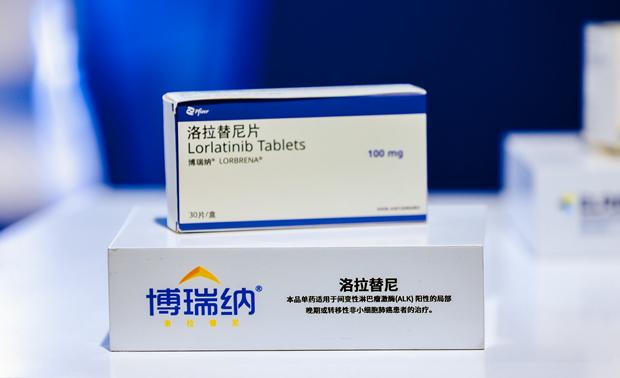
 0 Comment(s)
0 Comment(s) Print
Print E-mail China.org.cn, June 5, 2024
E-mail China.org.cn, June 5, 2024

A new drug from Pfizer could help lung cancer patients, especially those in China, achieve "ultra-long survival," according to the company's latest data. [Photo courtesy of Pfizer]
A new drug from Pfizer could help lung cancer patients, especially those in China, achieve "ultra-long survival," according to the company's latest data.
The U.S. drugmaker announced the latest results from the Phase 3 CROWN trial of its drug lorlatinib, sold under the brand name Lorbrena, at the 2024 American Society of Clinical Oncology (ASCO) Annual Meeting on June 1. The findings showed that 60% of patients remained alive without disease progression after five years, an unprecedented outcome.
The drug also demonstrated an 81% reduction in the risk of progression or death and a 94% reduction in the progression of brain metastases compared to the first-generation ALK inhibitor. These results suggest that early access to lorlatinib could allow more ALK-positive non-small cell lung cancer (NSCLC) patients to live longer and better lives.
The findings are particularly significant for China, where lung cancer is the leading cause of cancer-related deaths and tops both incidence and mortality rates. According to "Cancer Incidence and Mortality in China," released by the Journal of the National Cancer Center in February, around 1.06 million new lung cancer cases and 740,000 deaths occurred in the country in 2022.
Treatment for NSCLC in China has evolved towards precision medicine, with the disease increasingly being managed as a chronic condition. Patients with ALK+ NSCLC, referred to as the "diamond mutation," respond particularly well to targeted therapies, which have significantly improved their survival rates.
Lorlatinib was first introduced in China in 2020 through the Boao Lecheng Pilot Zone in Hainan province. In 2022, the innovative medicine was approved by the National Medical Products Administration and included in the National Reimbursement Drug List.
The updated analysis showed that lorlatinib also reduces the risk of developing brain disease by 94%. Designed to inhibit tumor mutations resistant to other ALK inhibitors and penetrate the blood-brain barrier, lorlatinib has been given a top recommendation for first-line treatment of ALK-positive advanced NSCLC in the latest "Guidelines of the Chinese Society of Clinical Oncology (CSCO): Non-Small Cell Lung Cancer," announced at the 2024 CSCO Guidelines Conference.
China was one of the multi-centers for the Pfizer study, in which 296 people with previously untreated ALK-positive advanced NSCLC. Patients were randomly assigned to receive either Lorbrena or Xalkori, another Pfizer drug, as their treatment.
"The results show that lorlatinib's efficacy in Chinese patients is comparable or even superior to its performance in previous global studies, further supporting lorlatinib as a standard of care for the first-line treatment of people with ALK-positive advanced NSCLC," said Professor Wu Yilong, chief expert at Guangdong Provincial People's Hospital and honorary director of the Guangdong Lung Cancer Institute.
Professor Wu added: "As lung cancer is increasingly being managed as a chronic disease, patient goals extend beyond merely 'living longer' to also 'living better.' We hope to further accumulate real-world data on lorlatinib application to support and guide the treatment towards a potential 'clinical cure' for more patients with ALK-positive advanced NSCLC."
"These results from the CROWN trial are unprecedented, as 60% of patients on Lorbrena are living beyond five years without disease progression, which will bring more possibilities and hope for many Chinese patients to live a longer and better life," said Jean-Christophe Pointeau, Pfizer global senior vice president and Pfizer China president.
He added that Pfizer, rooted in China for 35 years, has always ensured that Chinese patients benefit from global medical advancements. "In the future, Pfizer will continue to join hands with all parties in the fight against cancer to achieve the 'Healthy China 2030' goal of 'increasing the overall five-year cancer survival rate by 15%'," Pointeau said.
The "Healthy China 2030" initiative aims to increase China's overall five-year cancer survival rate by 15% by 2030. The cancer prevention and control implementation plan from 2023 to 2030 also specifies that the overall five-year cancer survival rate must reach 46.6% by 2030.
According to Pfizer's press statement, the latest progress in treating ALK-positive NSCLC provides scientific evidence and confidence in the fight against cancer, bringing hope and new possibilities for lung cancer and other tumor patients.
Go to Forum >>0 Comment(s)